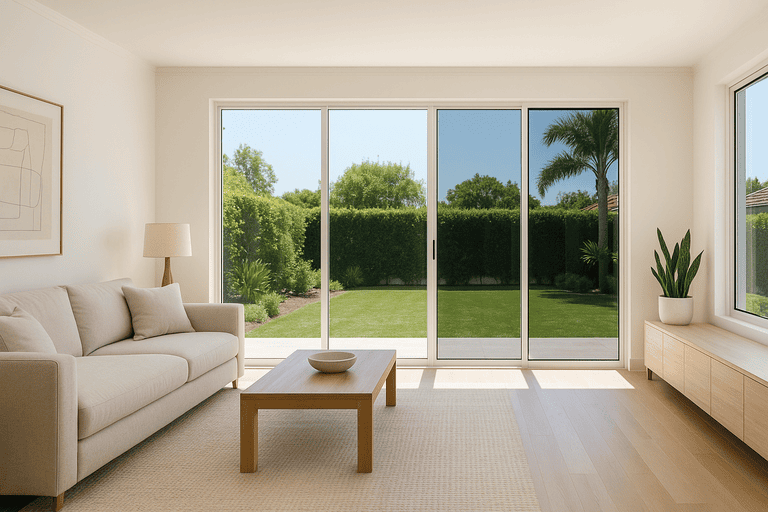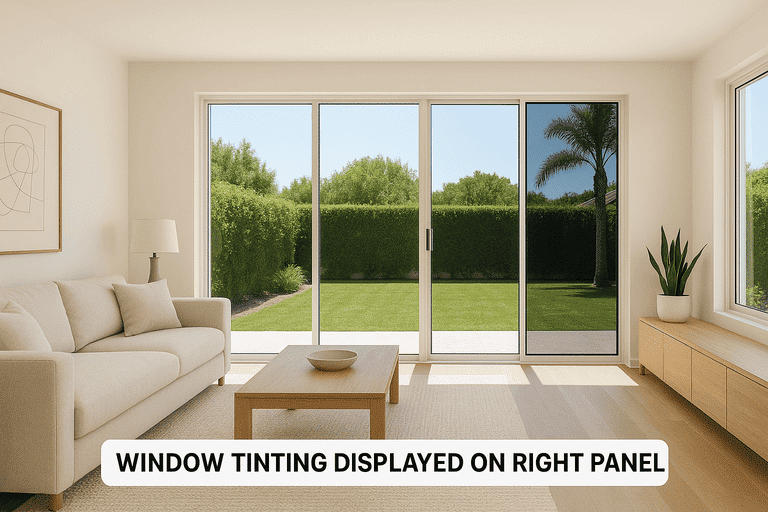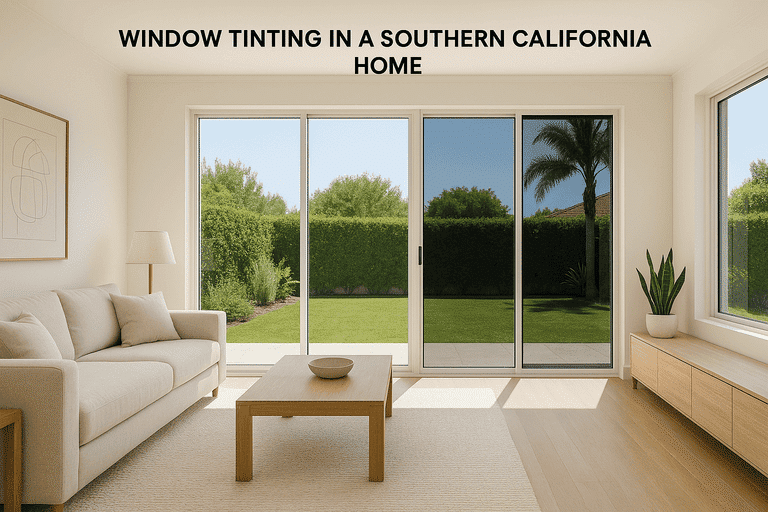Why Homeowners Are Tinting Their Windows in 2025
In sunny areas like San Diego and Southern California, home window tinting is more than a design choice—it’s a lifestyle upgrade. Modern window tint for home use not only boosts privacy but also reduces energy bills, increases comfort, and protects interiors from UV damage.
With energy costs on the rise and heatwaves becoming more common, window tinting offers a practical and affordable solution to block excessive sunlight without sacrificing natural light.

Key Benefits:
- Energy Efficiency: Reflects heat and lowers cooling costs
- UV Protection: Reduces fading of furniture and flooring
- Privacy Enhancement: Limits outside visibility during the day
- Glare Reduction: Improves TV and computer visibility
Types of Residential Window Tinting Films
Not all tints are created equal. Depending on your goal—whether it’s privacy, heat control, or aesthetics—there’s a specific film for that.
1. Solar Control Films
Best for energy efficiency. These films reduce solar heat gain and filter UV rays.
2. Decorative Films
Ideal for interior glass doors or bathrooms, they add style while diffusing light.
3. Security Films
Thicker and more durable, these films help reinforce glass and resist break-ins or storm damage.
4. Low-E Films
Perfect for San Diego’s varying temperatures, Low-E (low emissivity) films block heat in summer and retain warmth in winter.
Tip: For most homes in Southern California, solar control films are a popular and cost-effective choice.
How Much Does Home Window Tinting Cost in 2025?
The cost of tinting your home windows can vary depending on the film type, number of windows, and labor involved. Here’s a quick breakdown:
| Film Type | Average Cost per Sq. Ft. (Installed) |
|---|---|
| Standard Solar Film | $6 – $10 |
| Ceramic Film | $8 – $15 |
| Decorative Film | $7 – $12 |
| Security Film | $10 – $18 |
Example: Tinting a 2,000 sq. ft. home in San Diego with standard solar film might cost between $800 and $1,500, depending on the window count and size.
Pro Tip: Many professional installers offer free estimates. Be sure to ask about warranties and energy rebate programs in California.

Legal Considerations for Residential Tinting in California
Unlike car tint laws, California does not impose strict regulations on residential window tints. However, here are a few things to be aware of:
- Neighborhood HOA Rules: Some homeowners’ associations may have aesthetic restrictions.
- Visible Light Transmission (VLT): Most window films used in homes maintain sufficient VLT to allow natural lighting.
- Permit Requirements: Generally not needed, but check with local San Diego regulations if applying reflective or mirrored films.
Working with a licensed tinting professional ensures compliance and avoids costly removals later.
DIY vs. Professional Tinting – What’s Best?
While DIY window tint kits are available at home improvement stores, most homeowners in Southern California prefer professional installation for good reason.
DIY Pros:
- Lower upfront cost
- Good for small, low-risk projects (e.g., bathroom glass)
DIY Cons:
- Can result in bubbles, creases, or uneven application
- Films may not last as long or perform as well
- Often no warranty
Professional Pros:
- Clean, precise application
- Access to premium-grade film options
- Backed by labor and material warranties
- Expert advice on the best tint for your needs
Best for Southern California: A professional installer familiar with the region’s climate and homes can tailor the right film and ensure long-lasting results.

Choosing a Window Tinting Service in San Diego
There’s no shortage of tinting services in San Diego, but choosing the right one is key to a quality job. Here’s what to look for:
- Experience & Certifications: Look for companies with years in business and factory-certified installers.
- Product Variety: Make sure they offer different films suited to your specific goals.
- Warranty Options: A good installer offers at least a 10-year warranty—some even lifetime.
- Local Reviews: Check platforms like Yelp and Google for verified customer feedback.
- On-Site Consultation: Reputable pros will visit your home to assess light levels, glass types, and quote accordingly.
Tip: Ask about energy efficiency programs or rebates for Southern California Edison or SDG&E customers that might help offset costs.
